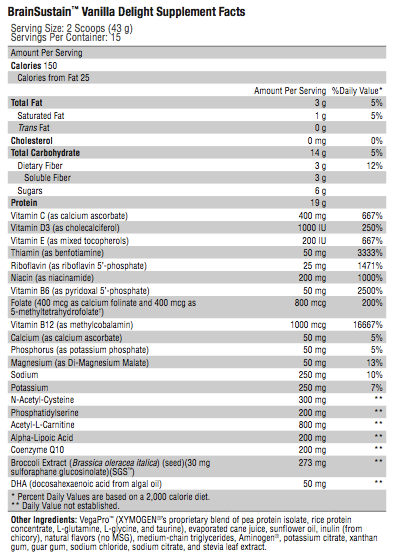Brain Sustain

Phosphatidylserine A phospholipid that is highly concentrated in
the brain, phosphatidylserine (PS) plays a key role in neuronal energy production and communication. Since very little PS is found in food, we must synthesize or supplement the amount we need for brain health. For some individuals, decreases in brain function may
be related to “age-related decline in nutrition,” and early nutrition intervention may be warranted. BrainSustain contains safe-source PS from non-GMO soy and contains no animal products.*
Acetyl-L-Carnitine (ALCAR) The ALCAR form of the amino acid L-carnitine is found to have multifaceted roles in supporting nerve health. It is able to cross the blood-brain barrier where it stabilizes cell membranes, acts as an effective antioxidant, and protects brain cells from toxic chemicals and stress-induced damage. In addition, ALCAR supports neuronal energy production, facilitates transport of fuel and waste products into and out of mitochondria, and supports production of acetylcholine, a neurotransmitter essential to the processes of learning and concentration.*
Alpha-Lipoic Acid Acting as both a fat- and water-soluble antioxidant, alpha-lipoic acid provides intracellular and extracellular protection against oxidative stress. With its low molecular weight, alpha-lipoic acid is easily absorbed in the gastrointestinal tract. It then enters circulation, crosses the blood-brain barrier, and reaches the brain where it can regenerate other important antioxidants, including glutathione, vitamin E, and vitamin C.*
Coenzyme Q10 (CoQ10) CoQ10 plays a pivotal role in energy generation because it transports electrons in the mitochondrial electron transport chain. CoQ10 also donates electrons, making it an effective antioxidant that may protect the brain from oxidative stress which is believed to be detrimental to neuronal cells.*
Broccoli Seed Extract The patented form of the phytochemical in broccoli called sulforaphane glucosinolate (SGSTM) is a key ingredient in BrainSustain. Extensive research demonstrates that when SGS is broken down to sulforaphane (its active form), it safely and effectively upregulates the Nrf2 system, enhances antioxidant production, and activates vital phase II detoxification enzymes. This process provides protection from common toxins and xenobiotics.*
DHA (docosahexaenoic acid) A conditionally essential fatty acid, DHA is the main polyunsaturated fatty acid in the brain. DHA supports the structure and function of brain cell membranes, and hence plays a fundamental role in neuronal communication. Studies also indicate that DHA is found to support the biosynthesis and accumulation of PS in neuronal and glial cells.*
VegaPro XYMOGEN’s proprietary pea/rice protein blend VegaPro is coupled with Aminogen® to facilitate protein digestion and absorption, and is lactose free. Amino acids from protein metabolism provide the precursors needed for neurotransmitter production.*
Micronutrients BrainSustain adult formula contains additional micronutrients for neurosupport, including magnesium, calcium, phosphorus, vitamin D3, vitamin E (as mixed tocopherols), and activated B vitamins riboflavin 5’-phosphate (B2), pyridoxal 5’-phosphate (B6), methylcobalamin (B12), and 5-methyltetrahydrofolate (folate). 5-MTHF (5-methyltetrahydrofolate) supports healthy folate nutrition, especially in those with genetic variations in folate metabolism. In BrainSustain, 5-MTHF is provided as Quatrefolic® for enhanced stability, solubility, and bioavailability.[18] In addition, two scoops of BrainSustain adult formula provide the same amount of NAC, PS, ALCAR, alpha-lipoic acid, CoQ10, and SGS as eight capsules of NeuroActivesTM BrainSustainTM.*
Directions:
Blend, shake, or briskly stir two level scoops (43 g) of BrainSustainTM into 8-12 oz chilled water, or as directed by your healthcare practitioner. Adjust amount of water to desired sweetness and/or thickness.
Directions:
For children four years of age or older, blend, shake, or briskly stir 1 level scoop (20 grams) of BrainSustain for KidsTM into 4-6 oz chilled water or other beverage, or as directed by your healthcare practitioner. Adjust amount of water to desired sweetness and/or thickness.
References:
- Sansone RA, Sansone LA. Getting a knack for NAC: N-acetyl-cysteine. Innov Clin Neurosci. 2011 Jan;8(1):10-4. [PMID: 21311702]
- Kato-Kataoka A, Sakai M, Ebina R, et al. Soybean-derived phosphatidylserine improves memory function of the elderly Japanese subjects with memory complaints. J Clin Biochem Nutr. 2010 Nov;47(3):246-55. [PMID: 21103034]
- Richter Y, Herzog Y, Cohen T, et al. The effect of phosphatidylserine-containing omega-3 fatty acids on memory abilities in subjects with subjective memory complaints: a pilot study. Clin Interv Aging. 2010 Nov 2;5:313-6. [PMID: 21103402]
- Vakhapova V, Cohen T, Richter Y, et al. Phosphatidylserine containing omega-3 fatty acids may improve memory abilities in non-demented elderly with memory complaints: a double-blind placebo-controlled trial. Dement Geriatr Cogn Disord. 2010;29(5):467- 74. [PMID: 20523044]
- Suchy J, Chan A, Shea TB. Dietary supplementation with a combination of alpha- lipoic acid, acetyl-L-carnitine, glycerophosphocoline, docosahexaenoic acid, and phosphatidylserine reduces oxidative damage to murine brain and improves cognitive performance. Nutr Res. 2009 Jan;29(1):70-4. [PMID: 19185780]
- Picconi B, Barone I, Pisani A, et al. Acetyl-L-carnitine protects striatal neurons against in vitro ischemia: the role of endogenous acetylcholine. Neuropharmacology. 2006 Jun;50(8):917-23. [PMID: 16500685]
- Steffen V, Santiago M, de la Cruz CP, et al. Effect of intraventricular injection of 1-methyl-4-phenylpyridinium: protection by acetyl-L-carnitine. Hum Exp Toxicol. 1995 Nov;14(11):865-71. [PMID: 8588946]
- Sorbi S, Forleo P, Fani C, et al. Double-blind, crossover, placebo-controlled clinical trial with L-acetylcarnitine in patients with degenerative cerebellar ataxia. Clin Neuropharmacol. 2000 Mar-Apr;23(2):114-8. [PMID: 10803803]
- Jones LL, McDonald DA, Borum PR. Acylcarnitines: role in brain. Prog Lipid Res. 2010 Jan;49(1):61-75. Review. [PMID: 19720082]
- Kobayashi S, Iwamoto M, Kon K, et al. Acetyl-L-carnitine improves aged brain function. Geriatr Gerontol Int. 2010 Jul;10 Suppl 1:S99-106. [PMID: 20590847]
- Packer L, Tritschler HJ, Wessel K. Neuroprotection by the metabolic antioxidant alpha- lipoic acid. Free Radic Biol Med. 1997;22(1-2):359-78. Review. [PMID: 8958163]
- Liu J. The effects and mechanisms of mitochondrial nutrient alpha-lipoic acid on improving age-associated mitochondrial and cognitive dysfunction: an overview. Neurochem Res. 2008 Jan;33(1):194-203. Review. [PMID: 17605107]
- Mancuso M, Orsucci D, Volpi L, et al. Coenzyme Q10 in neuromuscular and neurodegenerative disorders. Curr Drug Targets. 2010 Jan;11(1):111-21. Review. [PMID: 20017723]
- Ping Z, Liu W, Kang Z, et al. Sulforaphane protects brains against hypoxic-ischemic injury through induction of Nrf2-dependent phase 2 enzyme. Brain Res. 2010 Jul 9;1343:178-85. [PMID: 20417626]
- Vauzour D, Buonfiglio M, Corona G, et al. Sulforaphane protects cortical neurons against 5-S-cysteinyl-dopamine-induced toxicity through the activation of ERK1/2, Nrf-2 and the upregulation of detoxification enzymes. Mol Nutr Food Res. 2010 Apr;54(4):532-42. [PMID: 20166144]
- Chang CY, Ke DS, Chen JY. Essential fatty acids and human brain. Acta Neurol Taiwan. 2009 Dec;18(4):231-41. Review. [PMID: 20329590]
- Guo M, Stockert L, Akbar M, et al. Neuronal specific increase of phosphatidylserine by docosahexaenoic acid. J Mol Neurosci. 2007 Sep;33(1):67-73. [PMID: 17901548]
- Quatrefolic®. http://quatrefolic.com. Accessed September 26, 2011.








